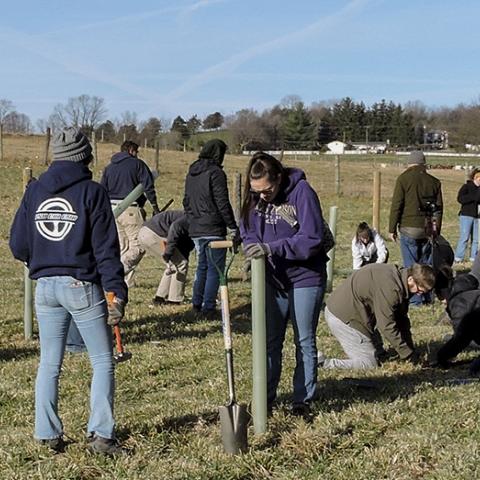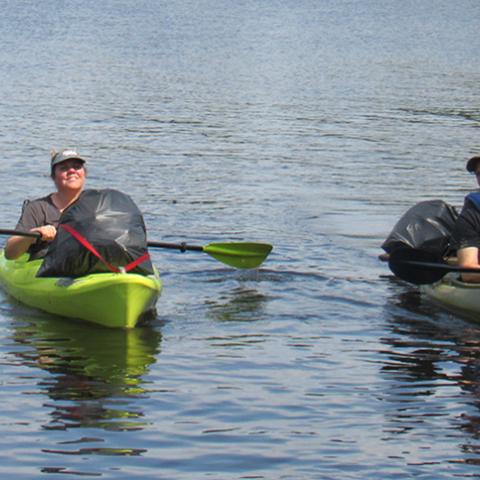Virginia Volunteer Spotlight
Virginia Volunteer Spotlight
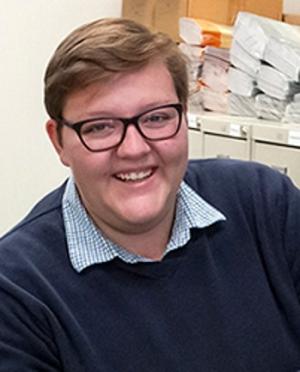
Hannah Clifford has put in 24 volunteer hours per week at the Fredericksburg service center for the last 14 months, so she is pretty well known in the office. For those who haven’t yet met her, we offer this introduction to our 2021 Virginia Earth Team Individual Volunteer of the Year:
The 23-year-old was raised on a farm in nearby Spotsylvania County and is no stranger to agriculture. She is a big believer in the NRCS mission who has set her sights on one day working for a conservation agency. Toward that end, Clifford reached out to her aunt Jan Massey, a retired Spotsylvania High School agriculture teacher, on next steps to reaching her career goal.
“My aunt is still raising cattle on her farm and has always been very well-connected with all the ag agencies around here, either as a volunteer or coordinating projects that involved volunteers,” Clifford said. “She said if I wanted a career with NRCS, which I did from the start, that I didn’t need to wait until I had my degree to start letting people in this office know who I am and what I can do.”
Soil Conservationist Matt Roberts first welcomed Clifford in early 2021 when he was serving as NRCS’ acting district conservationist in the busy field office. Roberts (who also began his NRCS career as an unpaid field office volunteer) was succeeded by Brian Wooden, who quickly became a Clifford fan.
“Hannah just has a great feel for conservation work,” Wooden said. “She’s good with our farmers, picks up on new stuff real fast and likes learning and taking on new responsibilities. The value she brings us as a volunteer is just tremendous.”
Clifford was in position to propose her volunteer arrangement because she’d made a mid-stream college change in 2019 from Longwood University in Farmville to an online degree program offered by Southern New Hampshire University. Shifting lecture and homework times allowed her to clear eight hours for NRCS every Tuesday, Wednesday and Thursday.
Clifford received her degree in December and is now working at a grocery store while pursuing a full-time position with NRCS. She says she most enjoys dealing directly with the local farmers who participate in agency programs.
“That’s why NRCS seemed like such a good fit for me,” she said. “I get a lot of satisfaction from explaining the benefits of conservation to farmers and then watching as they start applying conservation practices and it works out well for them. That’s what I want to keep on doing.”
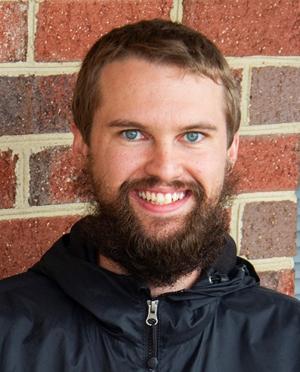
While Virginia cattlemen may not all know him by name, they should be reaping the benefits of Keith Thomas’ computer expertise for at least the next decade. Thomas didn’t just fix a buggy application. He developed replacement software to support grazing system modeling for all producers in the Commonwealth.
C-Graz, a valuable but often troublesome analytical tool, was formerly the best option for conservation agencies to estimate livestock/forage balance and project how proposed changes will impact a producer’s operation. NRCS staff members encountered problems using the tool even before they could no longer get technical support for software revisions or improvements.
“Keith seemed to understand our issues right away,” NRCS Grazing Specialist Bill Patterson said, “He asked if he could play around with it on his home computer and he came up with something to show me within four hours. It wasn’t in final form, but I could see that what he’d done had real potential.”
NRCS Forage and Grassland Agronomist J.B. Daniel was equally impressed. Thomas, a Harrisonburg native, then volunteered to develop a replacement tool on his own time as an Earth Team volunteer, eventually extending his commitment to improve and maintain the new program as long as it was in use.
Thomas’ new planning tool, named VA Graz, is a spreadsheet program that runs inside Microsoft Excel and is now available for use in all Virginia field or district offices. It has proven to be an immediate success. VA Graz has also been shared beyond its original target user group to include the Virginia State Cooperative Extension, the American Farmland Trust and the Chesapeake Bay Foundation.
“Keith’s tool provides precise and reliable estimates and we can break it down month by month if needed,” said Daniel. "When we present the illustrations to producers, they usually respond in a very positive way, particularly when they realize that they can take the money they’re investing in hay and use it to do other things that benefit both their livestock and the environment.
“There’s no downside. The producer gets the increases in production per acre and the option of decreasing hay production. We and the SWCDs make progress in attaining our conservation goals. This is a very powerful tool and Keith has put it in our hands.”
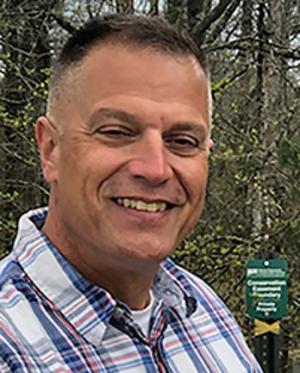
Maybe it was his 23 years of military training, but David Pace wasn’t about to tackle retirement planning without doing a little advance recon.
Pace went straight to work for a landscaping company coming out of high school in Pensacola, Fla. At age 27, he detoured to the U.S. Army for a four-year hitch before becoming a careerist in the National Guard. He eventually left Florida for Northern Virginia, where he’s lived while serving in a series of staff positions at the Guard’s national headquarters in Arlington.
While he won’t formally separate from the Guard until September, Pace’s accumulated leave time will allow him to retire in June.
“When I was looking around for opportunities after the military,” he said, “I saw a pitch for becoming an Earth Team volunteer. I read it over a few times and thought, ‘Wow! Is this up my alley or not?’ I had already decided that my passion is to work around people who are helping the environment. Earth Team was a chance for me to evaluate what it would be like to work for an agency like NRCS that seemed to share so many of my goals.”
Volunteering also brought Pace in contact with Peggy Shaw-McBee, NRCS’ district conservationist in Warrenton and, coincidentally, the agency’s special emphasis program manager for programs impacting military veterans in Virginia.
“We obviously don’t get many Earth Team recruits with David’s credentials,” Shaw-McBee said. “He started on Nov. 5, and works one full day every two weeks – usually on a Thursday. He packs a lot into that one day. Before the month was over, he reorganized our office’s entire filing system.
“Not long after that, he started going along with me on field visits to producers. On the rides out to the farms, we talk and he asks me questions about anything and everything we do. We learned early on that it’s hard to keep up with ‘the Pace.’”
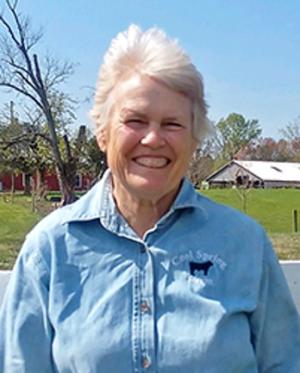
Jan Massey and her husband Bob own Cool Spring Farm, a 470-acre beef and crop operation in Virginia's Spotsylvania County. She has been an outstanding steward of the land and a friend of conservation for many years, participating in various Farm Bill programs.
The retired teacher taught agriculture in Spotsylvania and Louisa county schools and uses her position on the Tri-County/City (TCC) SWCD board of directors to advocate for this vocational training. She also planned and hosted the first field day TCC and the NRCS' Fredericksburg office had staged in a number of years.
More than 30 local producers and educators recently gathered at Cool Spring Farm to learn about the conservation practices the Masseys have installed with financial assistance from TCC and NRCS. Jan and Bob spent days cleaning up around their farm, preparing a hay wagon for use as tour transportation and preparing food for visitors. Jan also gathered all of her past contracts so she could effectively speak about her conservation practices.
Away from the farm, Jan serves on the TCC’s agricultural technical review subcommittee, making meaningful contributions to the missions of TCC and NRCS in that role. She is instrumental in outreach as she speaks with passion about conservation to anyone who is interested. She’s also an active networker in groups such as the Virginia Cattlemen’s Association and Virginia Farm Bureau.
“Jan uses every opportunity to help TCC and NRCS get our foot in the door with area farmers who may be interested in our assistance,” Kossler said. “She invites and hosts local high school students on her farm and exposes them to farm life and many conservation practices that most would never otherwise have experienced.”
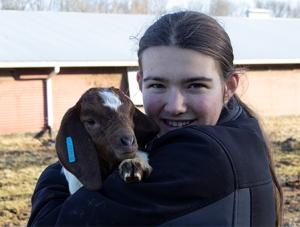
Felicity Zimmerman’s association with the Shenandoah Valley Soil & Water Conservation District officially began when she started working as an Earth Team volunteer in August of 2018.
Unofficially, her connection dates back to her first Dominion Envirothon competitions when the high school student and her teammates consulted with field office staff to prepare their oral presentations. Felicity's Envirothon activities led to an interest in getting more real world conservation experience.
She began a mentorship program with the Harrisonburg Field Office, working two or three days a week behind a desk and in the field. Felicity's assignments included conducting soil nitrate test analyses, surveying and assisting with project check outs. She also organized and labeled the office’s extensive inventory of cover crop seeds and accompanied district staff on three site visits to flood-control dams in the Shoemaker River watershed.
Felicity found time to offer a student’s perspective on improving the district’s Envirothon program and to write a well-received article, published in the Spring 2019 edition of The Virginia Forager, detailing her experiences as both a student in the Massanutten Technical Center’s (MTC) Agriculture Production Technology program and as a SVSWCD volunteer.
These days, Felicity is a busy senior at the nearby MTC, combining classwork and the husbandry and feeding of the center’s farm animals with sports, a part-time job at a local feed store and membership in her school’s FFA, drama club and Envirothon team.
Although her mentorship has ended, Felicity stills volunteers at the field office when time permits and would one day like to have a desk of her own. She’s changed her educational plans and will enroll in Blue Ridge Community College this fall to pursue a degree in natural resources/conservation.
The field office staff are eager to see her learn, grow and find her place in the conservation community in the years to come.
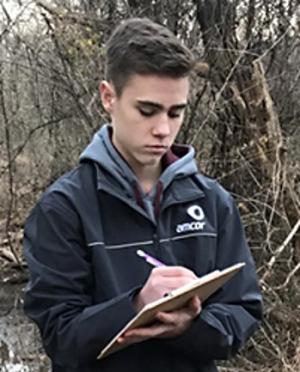
When he applied to the James River Leadership Academy (JRLA),* Dylan Rooks drew on personal experience to select a project that would benefit his watershed. He had learned about the dangers of e-coli contamination while serving as a children's camp counselor at Richmond's Belle Isle Park and wanted to help address the problem.
"I started hearing warnings about a deadly pathogen in the James that was making the water unsafe to swim in," Rooks recalled. "Adventure camp should be about kids having fun, not worrying about scary things polluting the water. So, I started thinking about how I could, as a camp counselor and a high school student, stop the pollution in my river."
The Henricopolis Soil & Water Conservation District played a key role in helping shape Dylan's JRLA project. Nicole Anderson Ellis, a district director and associate professor at Virginia Commonwealth University, served as his mentor with help from Conservation Specialist Stacey Heflin. Ellis encouraged Dylan to explore his watershed and develop recommendations for addressing the contamination issue.
Water quality testing of a creek near Rooks' home led him to postulate that dog feces from Varina's riverfront Osborne Landing Park were a possible cause of elevated e-coli levels in that part of the river. Rooks then started a one-year journey to develop a workshop series through the Livable Neighborhood Stewardship Program to help educate citizens about conservation measures that could be implemented in their neighborhoods or backyards.
The three community workshops highlighted practices such as pet waste composting, native plant and buffer establishment, vermicomposting and stormwater collection in rain barrels. Rooks had other ideas that never reached the project stage but felt his opportunity to work directly with the public and to educate “a new class of conservationists” more than made up for any frustrations. “It made me feel like I could be a leader,” he wrote. “I’ve even started working on a new river clean-up project.”
*JRLA is a year-long leadership program for rising 10th and 11th grade high school students who are committed to protecting the future of our natural resources in Virginia and the James River.


